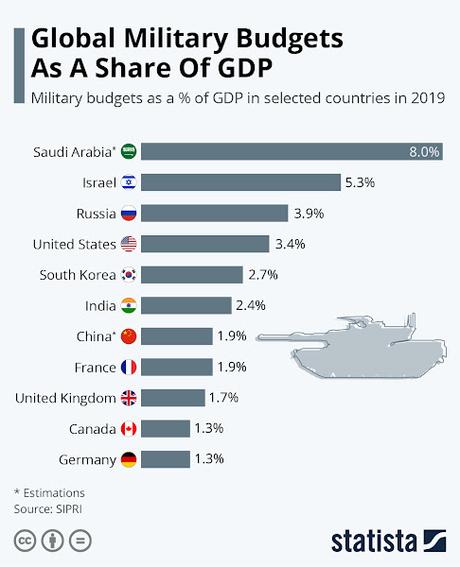
Ever since the Cold War era, defense spending has been a critical issue of burden sharing between the United States and its allies. Quite frequently, allies has been demanded to increase the spending, based on GDP ratio. In the Japanese prime minister race this autumn, LDP candidates discussed raising the GDP ratio of defense spending to 2% from the current 1 %.
However, Jeffery Hornung of the RAND Corporation recommended election contestants to focus on more important and more realistic measures to strengthen the US-Japanese alliance, rather than GDP ratio and enemy base strike capability, in an interview with Sankei Shimbum ("What will Kishida do in a crisis of the Taiwan Strait?"; Sankei Shimbun; October 21, 2021). According to Hornung, the United States wants Japan to show what it can do in case of a crisis in East Asia, notably in the Taiwan Strait. If it happens, it is the US troops in Japan that defends Taiwan from China. Therefore, Japan needs to make it clear what kind of contribution is possible, for example, whether to send a submarine to the East China Sea, to use JSDF surface to ship missiles deployed in the Nansei Islands, and anything else.
On another occasion, Hornung argued that Japan needs to maintain political stability, because a short-lived administration is frequently forced to prioritize domestic political agendas, and to depend on the help of the bureaucracy to make and implement policies. Furthermore, it would be less guaranteed whether Japan would comply with a bilateral agreement solidly, if the prime minister were to change frequently, which would ultimately pose severe constraints on US foreign policy ("What Instability at the Top Means for Japan's Alliance with the United States"; Nikkei Asia; September 22, 2021).
The alliance is mutual, not one-sided. Currently, the US-Japanese alliance is multilateralizing, as shown in European participation in the Free and Open Indo-Pacific initiative, and the development of the Quad with India and Australia. In view of this, it is increasingly important for Japan to discuss the division of the role with those global partners, rather than pursuing self-satisfactory measures that arise from domestic political interactions. We have to remember how much we were bewildered with erratic words and deeds by Donald Trump. Why acting like him?
The debate on spending is meaningless, if it is not associated with real strength. Nevertheless, not every decision in politics is rational. Occasionally, it is just symbolical without solid ground, as shown in the case of the Smithsonian agreement in 1971, in which both Japan and the United States agreed to raise the exchange rate from 360 to 308 yen against the US dollar. As to defense spending, the definition is different from country to country, and therefore, it is not necessarily effective to impose a sweeping target without examining the real capability.
Turning our eyes to the Atlantic area, we notice that defense spending and burden sharing have been a critical issue between the United States and NATO allies, too. America has frequently urged Europe to spend more on defense in order to strengthen the capability and solidarity of the alliance, since the Cold War with the Soviet Union. On the other hand, obsessed with the amount of expenditure, Trump pressured European nations that he would pull out US troops if they failed to meet the requirement, and continued to criticize his America First foreign policy. Actually, Trump was cutting troops in Germany at the end of his term, which was overturned by Joe Biden.
Trump's vengeful racketeering over the spending simply long mutual trust between Europe and America. Instead, he should have explored the division of the role within the regional security framework, and discussed necessary armaments for this objective.Ironically, he was supposed to lead that party of wise and effective spending at home, but in fact, he did not talk with allies how the money should be spent. Nasty emotional clash within the trans-Atlantic alliance. Regardless of the era and the country, leaders are repeating the same mistake.

